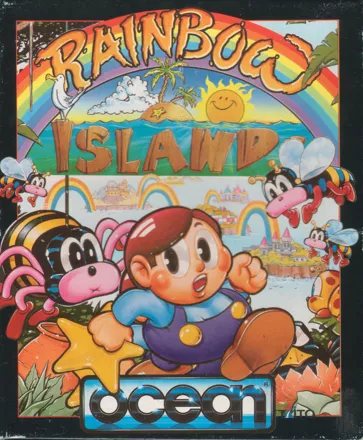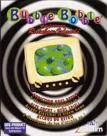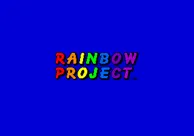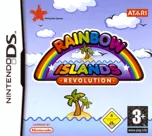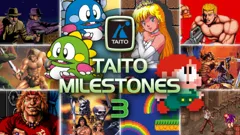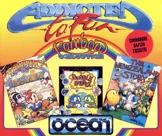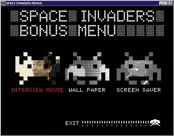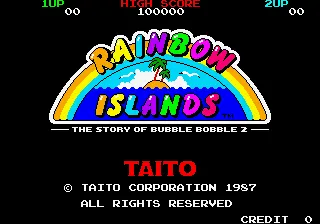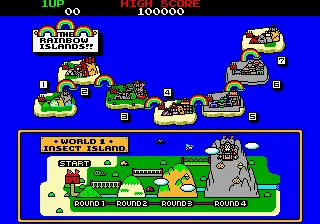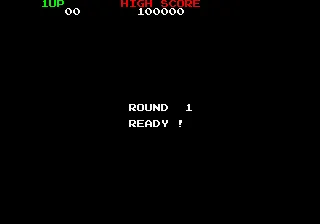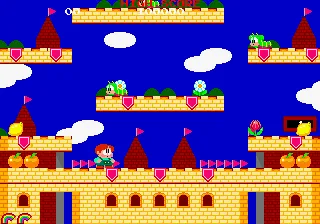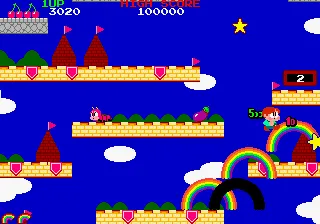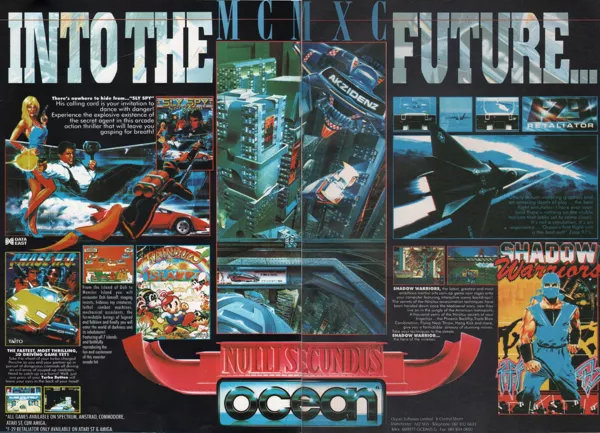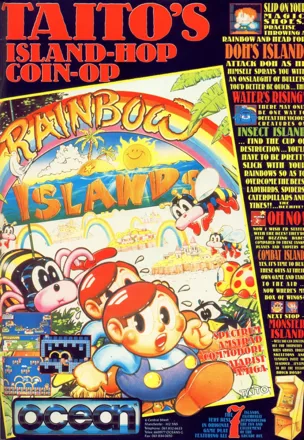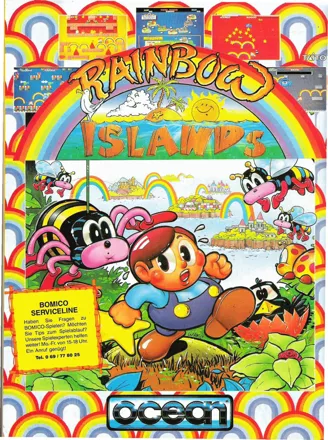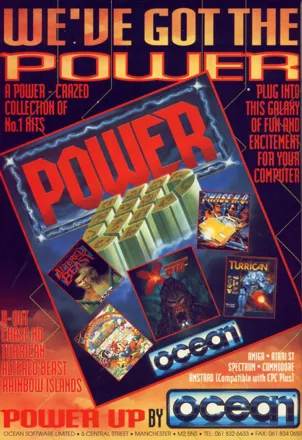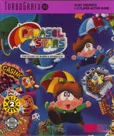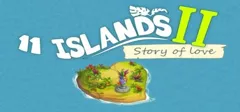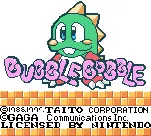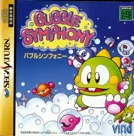Rainbow Islands
Description official description
Sequel to Bubble Bobble, Rainbow Islands sees Bub and Bob (in 2 player mode), who are now curiously small boys rather than dinosaurs, attempting to rid the Rainbow Islands of bad guys.
Using the power to cast rainbows, trapping anything underneath, the boys must ascend vertically 4 levels each island, with a big, bad boss at the end of each.
By trapping beasts under your rainbows, then jumping on them to break them you can collect seven different colored gems, and there are also power-ups for extra speed and rainbows.
Spellings
- レインボーアイランド - Japanese spelling
Groups +
Screenshots
Promos
Credits (Arcade version)
10 People (9 developers, 1 thanks)
| Software |
|
| Hardware |
|
| Character |
|
| Sound |
|
| Instruction |
|
| Story and Game Design |
|
| Special Thanks |
|
| Produced by |
|
Reviews
Critics
Average score: 86% (based on 47 ratings)
Players
Average score: 3.6 out of 5 (based on 119 ratings with 3 reviews)
As good a conversion as can be hoped for
The Good
There's a certain magic to this game that few others can come close to. The gameplay is brilliantly designed, with the rainbows adding all manner of seat-of-the-pants strategy. You can use them to 'shoot' bad guys, or trap them inside one's arc, or clip them with one. All the while you can let them go into just the right position so as to gain the gems you require, as which of the 7 colours you get depends on where the bad guy lands.
The seven levels are suitably varied in terms of the baddies on offer, with some having attack patterns and strategies that beggar belief in their intricacy, and well-drawn and colourful considering the limits of the system.
By scrolling vertically, and having the 'hurry up' feature forcing you to get to the top in a certain amount of time, the challenge is increased, and the tension is immense as you try to stay above water.
Controls are slick and responsive, and with no unexpected deaths or blind jumps (inevitable with the vertical scrolling) you know that every time you die, it's your own fault - something few platformers can claim.
The cutesy colours and music only add to the charm.
The Bad
The hidden fruit of the arcade game is gone, as are the secret islands (which werenn't even in the Amiga version), and some of the end-of-level baddies are a little too easy, especially Combat Island's helicopter
The Bottom Line
An unusual platformer, which like its predecessor Bubble Bobble (and sequel Parasol Stars) features gameplay largely structured around the use of a particular item - rainbows in this case. You fire them off with any contact killing bad guys. This can be on top of them, into them, or up at them. You start with only one, slow-paced rainbow, but up to 3 can be collected, as can a speed-up, as well as magic shoes which allow faster jumping.
The game is split into 28 levels across 7 different worlds, from Insect Island to Monster Island and Doh's Island, each featuring a variety of themed enemies. Each island ends with an end-of-level boss.
When bad guys die after being killed in particular ways, they release one of 7 coloured gems. Collecting all 7 in an island gives an extra life, but to complete the game properly you have to collect all 7 in the correct order, from red to violet in the order of the rainbow, every time. This'll take a while!
Commodore 64 · by Martin Smith (81712) · 2004
Superb game once mastered. A hell of a lot better than Bubble Bobble.
The Good
For raw playability this game is really up there. Once you realize what this game is about (getting those gems in Rainbow order), you begin to see that it goes a little deeper than your first expect. Once you get this game mastered you can quickly lose hours playing it. Much more playable than Bubble Bobble (at least in one-player mode).
The Bad
No simultaneous two-player mode! :( The original arcade didn't have it, but boy it would have been fun! Plus there's some islands missing (in order to fit the game into the Amiga's 512k memory, or so they said).
The Bottom Line
More fun that it first looks, another Amiga classic!
Atari ST · by Johnny "ThunderPeel2001" Walker (476) · 2003
Slightly better than Bubble Bobble
The Good
Rainbow Islands is the sequel to Bubble Bobble. In this predecessor, if you got to watch the true ending to this game, then you would have seen Bud and Bob rescuing their girlfriends, and transform from dragons to cute little boys (I apologize for referring to them as dinosaurs before). You don’t get to see the last of them, in Rainbow Islands, where all people who inhabit the Rainbow Islands are turned in bubble dragons, and either Bub or Bob must turn them back, and save the islands.
You job, as Bub or Bob, must get through seven islands filled with wildlife that are hazardous to your health, and the only way to survive on each island is to get rid of it. You do this, not by blowing bubbles, but by simply shooting rainbows at them, or by dropping rainbows onto them. You can also climb rainbows, then when you do, you can shoot more rainbows. This makes it easier to reach platforms. And not only that, but when you feel that you shot enough rainbows, you can jump on them and the rainbows drop. This last technique helps defeat bosses at the end of each island. Some enemies become more aggressive when you get further into the game, and throw things like fireballs, arrows, thunderbolts, and even bombs.
You start the game off with one rainbow, but once you collect enough items scattered on each island, you’ll end up getting to shoot three rainbows and with maximum speed. Unfortunately, if you lose a life getting through each of the islands, you have to start all over again. Each island consists of four rounds, making it a total of 28 rounds. At the end of each island, a boss, a larger version of one of the enemies you meet in each round, will be there waiting to knock you out. Each round has a time limit, meaning if you spend too much time in a round, the words “Hurry Up!” will scroll across the screen. Shortly after, water will flood the entire round, and drowning will result in a loss of life. This also applies when you are trying to defeat the bosses.
If you do survive all 28 rounds, you’ll receive a bad ending because you can’t save the inhabitants and turn then into human again. To do this, you must collect seven big diamonds on each of the seven islands. Collecting these will reveal three more islands, each with four rounds also, bringing the total number of rounds to 40. Then on all three islands, you must collect 21 more small diamonds so that you can get the three mirrors needed to start up the machine capable of turning the bubble dragons to normal people. This will eventually lead to the good ending.
The NES version also has dialogue in between islands, telling you a part of your mission. The background music in the computer versions (C64, Amiga, Atari ST) has a slightly distorted version of Judy Garland's classic Somewhere Over The Rainbow from The Wizard of Oz, while the console versions (NES, Sega Master System) plays a different tune altogether. The graphics in the Amiga version comes close to the arcade's, since the graphics have more of a cartoon feel to it. Rainbow Islands is available on all computers and consoles three years after it hit the arcades. The music in the console versions is slightly different from what you’ll hear in the computer versions, apart from the version included in this remake.
The Bad
Nothing, apart from the fact that I didn’t like playing Rainbow Islands again just to get the good ending instead of the bad one.
The Bottom Line
This game can might as well be addictive if you keep playing the same game just to receive more than one ending like Rainbow Islands. This game is followed by a sequel called Parasol Stars, where the object of the game is to wipe out enemies by using an umbrella on them, not by shooting bubbles or rainbows.
Rating: ****
Amiga · by Katakis | カタキス (43085) · 2003
Discussion
| Subject | By | Date |
|---|---|---|
| I don't know much about Bub & Bob... | Opipeuter (17203) | Oct 26, 2008 |
Trivia
1001 Video Games
Rainbow Islands appears in the book 1001 Video Games You Must Play Before You Die by General Editor Tony Mott.
Amiga Power controversy
Amiga Power magazine declared this to be the greatest Amiga game of all time in 1991, and controversially repeated this in their list compiled in early 1992, suggesting that titles like Formula 1 Grand Prix, Jimmy White's Whirlwind Snooker and Populous 2 were too specialised in their appeal, whereas Rainbow Islands was an across-the-board title. Ironically, Formula 1 Grand Prix was at #1 in the charts that month, and Jimmy White's Whirlwind Snooker had spent over 6 months in the top 5. The magazine claimed to be surprised when Rainbow Islands was as high as #7 in the readers' Top 100 later that year (two of the games above it, Sensible Soccer and Monkey Island 2 were released in between the two lists). It also made the top 10 in the magazine's 1993 and 1994 lists, and #18 in the next Readers' top 100 vote in late 1994.
Publishing of finished Atari ST and Amiga conversions delayed for months
Although the press got review versions of Rainbow Islands for the Amiga and Atari ST in mid-1989, the game wasn't released until 1990. The reason was with the game, the conversions were finished, but confusions about the publishing rights, were suddenly three companies claimed to have the rights to publish the game. First, Telecomsoft acquired the rights from Taito and assigned Graftgold for the conversion. But as the production deadline passed, these rights were automatically reverted back to Taito. Now Taito claimed all rights, not only for publishing, but on all work done with the game, especially the conversion by Graftgold, which they refused. With Microprose buy of Telecomsoft in 1989 things got complicated, as the finished conversions were included in the acquisition, but they also had no permissions to publish them. Finally, after all these troubles, the versions were released by Ocean months later.
Awards
- Amiga Joker
- Issue 01/1991 – Best Dexterity Game in 1990
- Amiga Power
- 1991 - Greatest Amiga Game of All Time
- 1992 - Greatest Amiga Game of All Time
- 1992 - #7 Greatest Amiga Game of All Time (Readers' vote)
- Commodore Format
- May 1991 (Issue 8) - listed in the A to Z of Classic Games article (Great)
- January 1992 (Issue 16) - Cf's all time Top Ten Essential Mega Games
- July 1993 (Issue 34) - Modern Classics: Platformers
- March 1994 (Issue 42) Heaven – The Path to Righteousness: 20 Essential Games
- November 1994 (Issue 50) – #13 The All-Time Top 50 C64 Games
- October 1995 (Issue 61) – The Top Ten C64 Games of all Time
- EMAP Image's Golden Joystick 1991
- April 1991: Best coin-op conversion - 8 Bit
- Power Play
- Issue 01/1991 - Best Dexterity Game in 1990 (Amiga, Atari ST and C64 versions)
- Issue 01/1991 - Best Arcade Port in 1990
- Retro Gamer
- October 2004 (Issue #9) – #30 Best Game Of All Time (Readers' Vote)
- Issue 37 - #10 in the "Top 25 Platformers of All Time" poll
- ST Format
- Issue 01/1991 - Best Platform Game in 1990 (Atari ST)
- Issue 08/1991 – #7 Top Atari ST Classic Games (Editorial staff vote)
Information also contributed by PCGamer77.
Analytics
Related Sites +
-
Rainbow Islands - Creator's Blog
Andrew Braybrook's blog, reflecting on the creation of the home conversions of Rainbow Islands. -
Rainbow Islands - Work in Progress report (March 1989)
Article from UK magazine The One about the home computer conversions by Graftgold. -
Take Control of Rainbow Islands (part one)
Amiga Power magazine 1991 guide to Rainbow Islands, part 1 -
Take Control of Rainbow Islands (part two)
Amiga Power magazine 1991 guide to Rainbow Islands, part 2
Identifiers +
Contribute
Are you familiar with this game? Help document and preserve this entry in video game history! If your contribution is approved, you will earn points and be credited as a contributor.
Contributors to this Entry
Game added by Famine3h.
J2ME added by Trypticon. Commodore 64 added by Quapil. Arcade added by ryanbus84. Atari ST added by Rebound Boy. Windows added by Kabushi. ZX Spectrum, Amstrad CPC added by Martin Smith. TurboGrafx CD added by Tim Janssen. NES, Game Boy Color added by Katakis | カタキス.
Additional contributors: Alaka, Martin Smith, Atom Ant, formercontrib, Patrick Bregger, S Olafsson, Jo ST, worth坊や, FatherJack.
Game added November 10, 2002. Last modified February 27, 2025.


